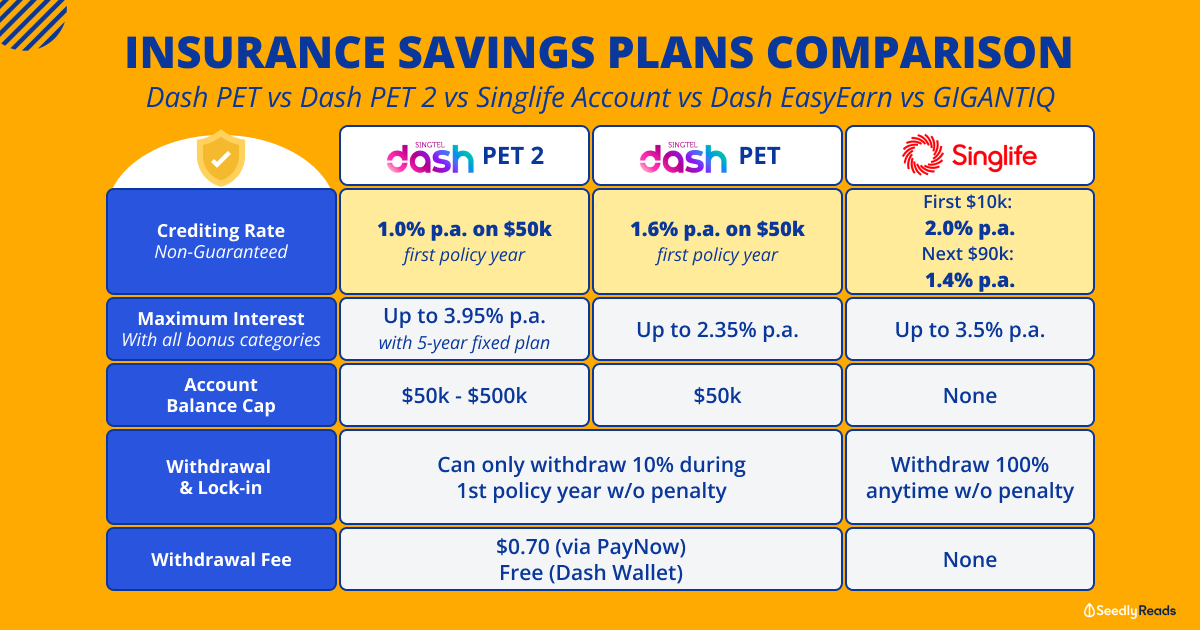Advertisement
Anonymous
Is buying a savings plan from insurance company wise? Which savings plan will you recommend?
Anyone has any words of advice on whether this would be a good move?
4
Discussion (4)
Learn how to style your text
Pang Zhe Liang
17 Mar 2020
Lead of Research & Solutions at Havend Pte Ltd
Reply
Save
Elijah Lee
16 Mar 2020
Senior Financial Services Manager at Phillip Securities (Jurong East)
Hi anon,
You will have to see if a savings plan suits your needs before getting it. Firstly you will need to define an objective that you are trying to reach, it could be an accumulation goal, etc, and then you'll want to see if a savings plan is the instrument you prefer to use to reach that goal. Naturally there are pros and cons, the key ones being:
Pros:
A guaranteed return. Good ones have 2+% compounding over 20+ years
Upsize participation in the markets through the participating fund without undue exposure to the downside
Practically zero correlation to market movements (save for the impact on bonuses in a bad year)
Payor benefit riders means that the goal to save $X by a certain period (say for a child's education) will not be interrupted in an unfortunate event of the payor's demise
Protected for up to $100K of the surrender/maturity value by policy owner's protection scheme (so they can't do a hyflux on you)
Death coverage (though minimal, usually 105% of premiums paid. Just use a term for this)
Cons
They require a commitment over a period of at least 5 years, or more (I won't talk about policy loan should you be unable to pay, that really should be the last resort)
Non-existent liquidity until maturity of the plan (you could surrender prematurely, but you'll lose money)
Yields may lose to outright investments in the long run if you are good at investing.
Require a long time horizon to realise the full benefits
During maturity, terminal bonuses may be impacted in a bad year, especially if the weightage of TB is higher. (i.e. if your plan matures during a crisis, you'll be clean out of luck)
With that said, you'll want to see if the pros outweigh the cons for you. If they do, then a savings plan may be the instrument you are looking for. Having said that, your portfolio can't just consist of savings plans (unless you are so fearful of taking risk). Branch out and diversify your baskets of eggs.
Reply
Save
Tan Li Xing
16 Mar 2020
Financial Consultant at Prudential Assurance Company (Singapore)
Hi Anon,
Buying a savings plans from an insurance company would be considered a safe investment, as...
Read 2 other comments with a Seedly account
You will also enjoy exclusive benefits and get access to members only features.
Sign up or login with an email here
Write your thoughts
Related Articles
Related Posts
Related Posts
Advertisement







Let me give you a detailed breakdown on how a savings endowment plan work, and how to choose one.
Participating Policy
Generally, endowment savings plan are participating policies. As a result, your money is invested into the insurance company's participating fund. With this in mind, it will be good to understand on how a participating fund works.
More Details:
What is a Participating Fund?
For the most part, it is important to understand the investment allocation made by the participating fund. For instance, one company may place greater emphasis on equities in order to give policyholders the same rate of return as compared to another insurance company that placed greater emphasis on bonds.
As a result, most of us prefer a more conservative route since it is unnecessary to take additional risk than required for the same return (to policyholders). Furthermore, this leads to higher expenses which will indirectly affect the policyholders (explanation in my post on participating fund).
Bonuses
Next, we will find out how we get our cash value in return through declared bonuses. Generally, there are termed as Reversionary Bonus and Terminal Bonus.
More Details:
Reversionary Bonus and Terminal Bonus Singapore
Different insurance companies may give a different rate of bonus to their policyholders. This is usually based on the sum assured in the policy. As always, the higher the rate, the more money that you get.
Also, take note that the compounding rate may differ too.
More Details:
What is Compound Interest?
Smoothing of Bonuses
Some of the insurance plans adopt the concept of smoothing of bonuses in order to give the same rate of returns to the policyholder.
More Details:
Smoothing of Bonuses Singapore
In order for smoothing of bonuses to work, the insurance company's participating fund must have proper track records and returns over time. Otherwise, there is simply nothing much that the fund can give to its policyholder.
For example, here is the latest result from AIA Singapore: https://www.blog.pzl.sg/aia-singapore-participa...
So how?
All in all, I have highlighted some of the key points to look out for when choosing a good savings policy that is capable of providing a stable rate of return over time. On balance, track records is one of the best thing to look out for since the future will always be uncertain. As such, I believe AIA Singapore checks the boxes.
That being said, comprehensive financial planning is required in order to give you the right financial advice on which type of planning is able to give you the flexibility and return that you need.
Here is everything about me and what I do best.